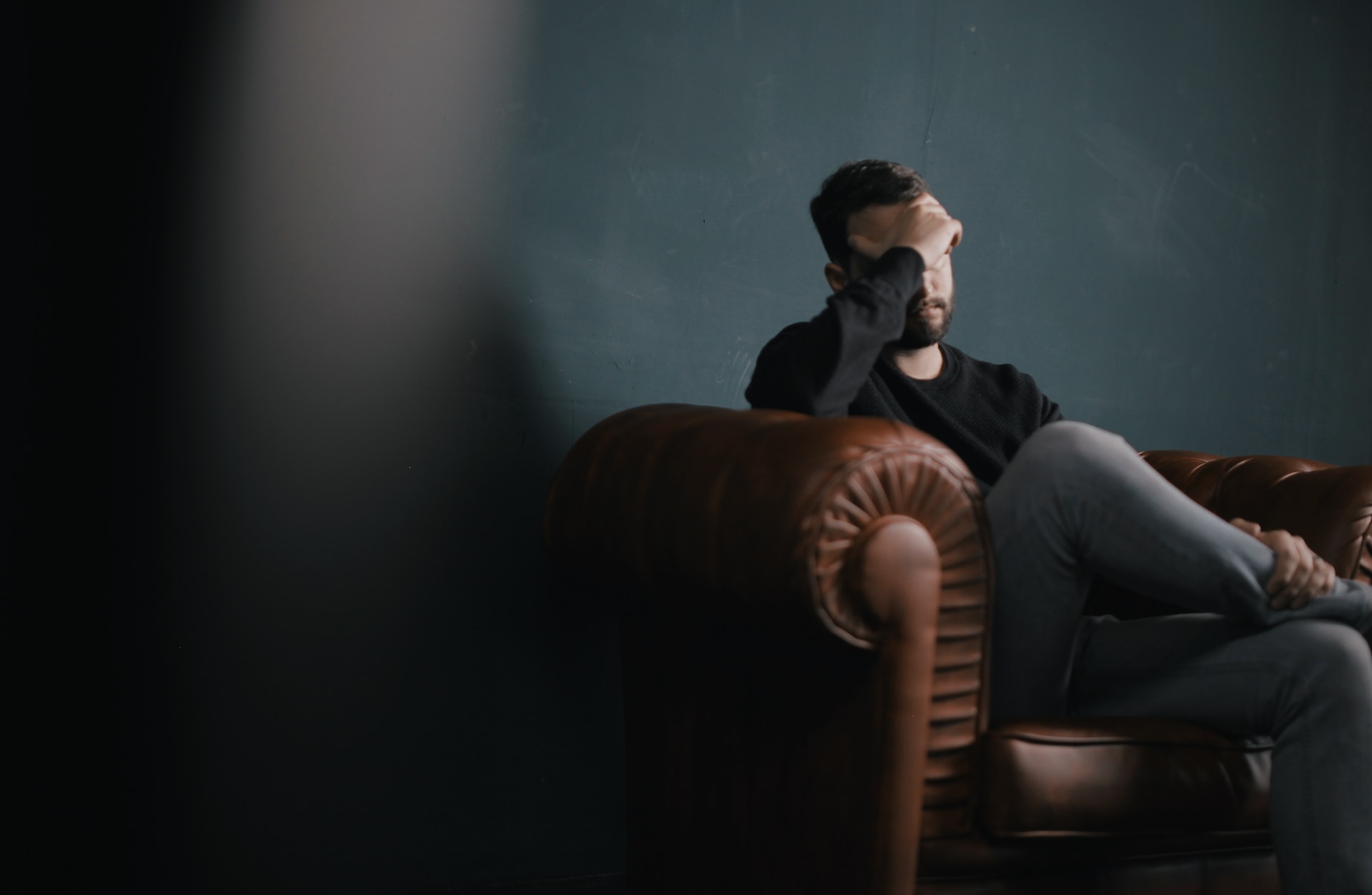The roots, the bedrock of fear and anxiety are often found in the day-to-day. Fear shows up in our daily routines, on our way to school, or during the morning shift at work. It is found in the middle of the night as we awaken abruptly from a dream. Fear is found as we take our kids to school or tuck the kids in bed for the night. And while our fear and anxiety often focuses on the catastrophic, it shows up in the mundane.
Caught In The Overflow
I come across a lot of articles on fear and anxiety. Since fear is something I have been profoundly impacted by, I look for new information, new perspectives, and frankly anything I can find. I read the psychology-based articles as well as the practical, life-hack articles which suck you in with their catchy titles. I read YouVersion reading plans, itching for any new, fresh Biblical perspective on fighting fear. I read audiobooks on anything related to fear and anxiety. I see the catchy bumper stickers, coffee mugs, and T-shirts all with clever phrases encouraging believers to choose Biblical faith over everyday fear.
While our fear and anxiety often focuses on the catastrophic, it shows up in the mundane. -Craig Booker
A Pinch Of Cynicism
Many of these sources seem to talk about fear without really talking about fear. Sounds silly right? I believe there is tremendous value in a lot of the sources I come across, but sometimes I feel like they completely overlook the practical, everyday side of fear and anxiety. So hence my cynicism. There are a lot of resources out there, more than ever before, but sometimes I simply want to stop and acknowledge the struggle. Not so we can get stuck here, but to acknowledge just how hard the battle can be.
What To Expect
In this article, I hope to explore various responses to fear and how I have seen them play out for better or worse. I vow to be incredibly transparent and share insight where appropriate. To aid the discussion, I will categorize approaches to fear as either passive or active. This will not cover every circumstance but will help to navigate the discussion.
First, let me begin by saying that these groups are here as a guide. They serve to help us move forward in our understanding of fear responses. They are a starting place. The categories are not a judgment of you or someone you know who is battling fear. I do not believe that understanding fear responses is this simple, but I believe this classification will serve to help us move towards a greater understanding.
Let’s Talk About The Struggle
The events and circumstances in life all hold the potential to instill fearfulness. -Craig Booker
Let me say that again. The events and circumstances in life all hold the potential to instill fearfulness. How we respond to everyday events can drastically change the trajectory of our lives. This idea leads me to ask more questions. Could we somehow determine how to handle such events in advance? Maybe not the details, but could we decide to react in a way that brings life instead of death? Could we develop healthy habits that set us up for positive outcomes? While I am eager to get into all of these questions, first we need to to understand response types.
Yielding – A Passive Approach To Fear
First off, I want to address a question many of you might be thinking about already. What happened to the idea of running from your fears? A completely valid question. Again, let me acknowledge that everyone’s experience with fear and fearfulness will be different. I am approaching the topic of fear from an overwhelming, inescapable sense of fearfulness.
This is not the type of fear that occasionally sneaks up on a person. This fear is not convenient, one cannot simply put it in a box and hope it doesn’t affect the rest of their life. This is fear that a person feels they cannot escape. It exists in their waking thoughts, in their dreams, and the subconscious.
Individuals experiencing this type of fear do not see escaping it as an option. This is why it is so common for people to yield to their fear. For someone who is experiencing fear and anxiety on this level, it can feel like they are caught up in an overflow of darkness. If this is you, know that I see you. Know that there is hope for you.
Fear And Anxiety – A Practical Discussion
When it comes to anxiety or fear yielding is something many people do because they see no other solutions for coping with anxiety. One of the most practical explanations of anxiety I have found, I read in Louie Giglio’s YouVersion reading plan, “Putting an ‘X’ Through Anxiety. On Day 5 of the plan, Louie breaks down anxiety in its most basic sense.
“During my journey, it was important to realize my ‘anxiety’ wasn’t a thing in and of itself. Rather, my anxiety was a symptom of something else. I found myself saying things like, ‘I’m not going to be able to make it to work today, my anxiety is acting up again.’ Or, ‘I feel like my anxiety is rising up, I better go lie down.'” –Louie Giglio
Pay special attention here to the statements Louie is making.
- “I’m not going to be able to make it to work today, my anxiety is acting up again.”
- “I feel like my anxiety is rising up, I better go lie down.”
On a personal, first-hand account, I completely identify with Louie’s statements. I have said very similar things time and time again. Essentially, when someone says these types of statements, what they are saying is, I feel a great deal of anxiety and I do not know if I can handle the situation or the anxiety. The only response the individual knows in this situation is to bow to his or her anxiety.
A Word of Caution With This Approach
When fear or anxiety is handled in this way, anxiety is not processed properly. Not only that, but we limit our ability to move forward. We become stuck in an unhealthy cycle of anxiety or fear. Going to lay down MIGHT help, but more likely than not, it does nothing to benefit us long-term. In my own experience, I have also seen this occur utilizing laying down or anxiety medication as an alternative to going to lay down. The rest or anxiety medications seem to calm the surface-level symptoms but did nothing for me long term. The next time fear struck, I found myself in the same position. It perpetuates a fear cycle.
When Is Yielding Appropriate?
For many who are at the onset of experiencing chronic fearfulness, you might feel so overwhelmed that you simply cannot do anything but yield. To you, I say I understand. I have been exactly where you are and I pray your world stops spinning out of control very soon. When experiencing these extreme emotions, it is important to take great care of yourself and surround yourself with the right people. The goal for me at this stage was to stabilize myself, my fear, and my anxiety.
So What Should You Do?
PLEASE NOTE: I am NOT a doctor or a counselor. If you think you or your loved one might need help, please seek out a doctor or counselor for more resources.
This is not the time to try and figure everything out or to find someone or something to blame. This is a place where self-care is paramount. Finding the right doctor is important in this stage. It is helpful to find a great counselor which you trust. Putting your support system in place is a wise thing to do at this point.
This sense of overwhelming fearfulness is a sign that you need to stop and take care of yourself. There is no shame if you find yourself here. There is no standard expectation for this stage. You will know it is time to move on when your world starts to come to a halt. You will start to feel more comfortable with the basic things in life.
Why I Started Here
When choosing which type of response to cover in what order, I purposefully chose yielding or bowing to fear as the first item, as I believe it hits home with so many affected by fear and anxiety. This was where I started when dealing with my fear and I know it is true for so many people.
Engaging In Battle – An Active Approach To Fear
I believe there comes a time when individuals overwhelmed with fearfulness want to take action to get better. From a medical standpoint, prescription medication is the primary approach to treating anxiety, fear, and depression. There are a lot of practical approaches to treating persistent fearfulness. I have implemented and found success with many practical approaches to dealing with anxiety. I have also seen how responding to fear with faith can do things not possible through practical or medical means. When it comes to responding to fear and anxiety with faith, I will caution people that this is not the quick fix they may be seeking.
Medical Treatment
During my personal experience with treating chronic fearfulness and anxiety, doctors focused almost entirely on prescription medication as the method of treatment. Many, many times I found myself increasingly frustrated with the U.S. healthcare system. Not for political or financial reasons, but because none of the professionals seemed to have any real long-term solution for anxiety. Initially, when my world was spinning out of control, I needed prescription medication. I was not able to stop the spinning without the help of medicine. It helped me tremendously. I am truly grateful and acknowledge that I was privileged to have access to this type of treatment.
No Big Picture Plans
After my world stopped spinning, I started to look for steps to take towards recovery. What I found rather disturbing was the lack of a big picture plan in treating fearfulness and anxiety. Medical doctors seemed too focused on prescription medication management, without any mention of other long-term strategies. They seemed content for me to continue taking medication indefinitely. I understand that with some diagnosis, this is the reality of the condition, but not with mine. My limited research showed me I did have other options.
Psychologists And Counselors
My first psychologist spent a long time analyzing my past looking for answers. Again, no mention of any type of long-term strategy. I was drowning, looking for hope anywhere, but none could be found. I needed easy, practical solutions to help fearfulness subside, but none could be found. There were brief mentions by my medication management doctor of counseling as something “you could try”, but she did nothing notable which made me think I should find a counselor.
Medication And Fear Cycles
I learned that if I am not willing to do something alongside taking the medication, the “treatment” did nothing to help me deal with my anxiety. In my experience, medication on its own simply masks symptoms. Certainly, without knowing any better way to cope, this is seemingly our best option. I, however, quickly became sick of remaining in a never-ending state of fear and anxiety which I call a fear cycle.
What Is A Fear Cycle?
A fear cycle is a period where fear spikes and gradually subsides back to normal levels. I discovered that the lifespan of a fear cycle is often determined by the intensity of the trigger, self-care practices, and other stressors. Experiencing additional fear triggers mid-cycle, would frequently increase the level of fear and increase the length of the current cycle. The medication would dull my exterior responses to triggers, flatten my emotions, and make it appear as though I was better. In all reality, I was far from better.
Perpetuating Fear and Anxiety
Medication tended to perpetuate the anxiety because I was never dealing with the core cause, I was masking outward symptoms. This made others around me feel better, but it did nothing for me. So anxiety compounded over time as a result of not dealing with it. This compounding anxiety would push me towards greater levels of depression. In turn, my doctor would prescribe additional medication targeted at treating depression. Oftentimes new medications in combination with current ones would create new side effects.
No Condemnation
Please understand that I am in NO WAY condemning people for getting stuck in dealing with anxiety or fear in this way. I still fall back into fear cycles. I hope that by sharing my experience, I can provide others with hope. Why? Because honestly, as followers of Jesus, we have way more options than professionals let on. More on this to come in future articles.
The Role of Self-care
The greatest contributor to lowering my levels of fear had to do with greater levels of self-care. The essentials of self-care have to do with proper diet, sleep, and exercise. Sleep was the easiest of these for me personally because I was too afraid to do anything during my day. Sleep was the only time I could escape.
After observing my increasing levels of depression, my prescription management doctor suspected I had Sleep Apnea. Upon her brilliant observation, I visited a sleep specialist and was diagnosed with Sleep Apnea. Proper sleep had a greater visible impact on reducing my anxiety and depression than all of the medication combined. I was not suddenly healed, but I was seeing improvement. Overall, I began doing better as a result of better sleep and started walking down my street for exercise. The exercise helped, but I was not as consistent which lowered its effectiveness. The encouraging thing was that I saw how self-care activities decreased the effects of anxiety and depression.
Counseling
I tried several counselors and had limited improvement. After what seemed like an eternity, I finally found a counselor who seemed interested in pursuing solutions that could change things for the better. You could tell he might not have all the answers, but at least he wanted to find real results. It is here I landed and started making real progress with actual solutions. The solutions did not come quickly nor were any of them easy, but gradually I began to make progress. I had to be willing to invest the time and emotional work necessary, but things started to work.
HOPE – We Have Options
And while I fully appreciate how challenging facing fear can be for those who experience anxiety on a chronic or even basic level, I also believe God is much bigger than our fears. I believe that God wants more for us than to simply yield to our fears. I believe that it might not always be evident, but God always gives us options when it comes to fear. I don’t say this to discount your condition in any way. I say this because I believe God can and will work miracles in your life.
For twelve years, I never thought there were any options in dealing with my fear. So all I did was yield to it. For the first three years of my experience with chronic anxiety, I searched desperately for the smallest sense of relief from the fear which had consumed me. I was doing anything I could to stop the world from spinning out of control. I spent a total of nine years yielding to fear without any hint as to how it gets better. In year ten, God started to show me that I have real options when responding to fear. What I have learned is these options often start with a change in my perspective.
NOTE: In future articles, I will explore the questions mentioned under Let’s Talk About The Struggle.
If you would like to be notified when new articles are posted, sign up for our newsletter


